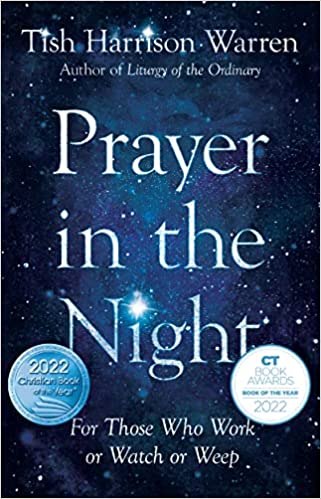This week we return to the Rev. Tish Harrison Warren’s book Prayer in the Night: For Those Who Work or Watch or Weep. Please read chapter 7 “Tend the Sick, Lord Christ: Embodiment.”
The Prayer:
Keep watch, dear Lord, with those who work, or watch, or
weep this night, and give your angels charge over those who
sleep. Tend the sick, Lord Christ; give rest to the weary, bless
the dying, soothe the suffering, pity the afflicted, shield the
joyous; and all for your love’s sake. Amen.
1979 BCP 134
A Blessing in Sickness:
Sickness is an evil. “Sickness is not the way things are supposed to be, and we don’t have to pretend otherwise.” p.97. However, “sickness is an occasion – however uninvited – to grow in repentance and virtue.” p.97. Sickness has its benefits.
First, sickness reveals who we truly are. When we are sick and our will is overcome, we then realize that we are not as virtuous or Christ-like as we think ourselves to be. In Mere Christianity, C.S. Lewis comments that “It is only our bad temper that we put down to being tired or worried or hungry; we put our good temper down to ourselves.” When we are sick, our true selves in all of our fallenness is shown. This recognition of who we are is the first step towards repentance and amendment of life.
Second, at the same time and for the same reason, sickness reveals both our need for God and God’s grace in our lives. When we are sick and broken down we “find then that God meets us precisely when we have nothing to offer.” p.97. If the Christian life is one of placing our full faith in the fullness of God – Father, Son, and Holy Spirit – then sickness can take us to the point where there is no other option. Many of us only turn to God as a last resort, and sickness can take us to that place.
Finally, for some (though certainly not everyone) it is in sickness that spiritual transformation occurs. For example, the great medieval English mystic Julian of Norwich (1342-1416) experienced her “shewings” or revelations while seemingly on her deathbed. Ignatius of Loyola, the founder of the Jesuits, likewise received his special call from Jesus while recovering from surgery. It is at our greatest weakness in sickness when God can speak to us most directly.
Tending the Sick:
As Rev. Warren points out, the Prayer does not ask that the sick be healed, but that they be tended. The Prayer does not request a physician but a shepherd. What we are asking, is that God will guide us into the blessings that sickness can provide. The request “challenges us to believe that we need something even more than we need wellness.” p.100. We need holiness, humility, and freedom, and sickness allows God to guide us into these virtues. We simply “need to learn, through long practice, to watch for God at work.” p.100.
Healing Service:
Going back to the very first Book of Common Prayer in 1549, our prayerbooks have always contained a service for the Visitation (or Ministration) of the Sick. In our current prayerbook, this service is found on pages 453-61. Every Wednesday at noon, Messiah has a healing service from these prayers. This service is not simply for those suffering from acute sickness but for anyone in need of physical, mental, or spiritual healing. Tonight, in lieu of Compline, Fr. George has agreed to administer a healing service at the conclusion of our discussions. If you cannot join us tonight, I encourage you to read through this service. The service contains prayers to be used not only by a priest but also prayers for us individually as we go about our day.
Questions and Practices:
Rev. Warren’s suggested questions and practices for chapter 7 are:
1. Recall a time when you were really sick. How did your perspective about what is important or necessary change through that experience?
2. How do you experience the reality of vulnerability in your body? Has that affected your spiritual life or your spiritual practices?
3. Does weakness in your body ever act as a memento mori for you? Does it remind you of your death or your limitations?
Dinner is at 6. The menu is ham and bean soup (We are having soup during the entire Lenten season.) Discussion about 6:45. A service of Ministration for the Sick at 8.
This is another day, O Lord. I know not what it will bring forth, but make me ready, Lord, for whatever it may be. If I am to stand up, help me to stand bravely. If I am to sit still, help me to sit quietly. If I am to lie low, help me to do it patiently. And if I am to do nothing, let me do it gallantly. Make these words more than words, and give me the Spirit of Jesus. Amen.
A Prayer in the Morning. 1979 BCP 461

